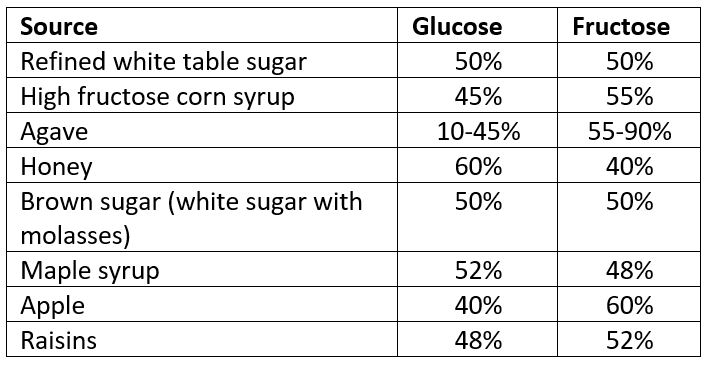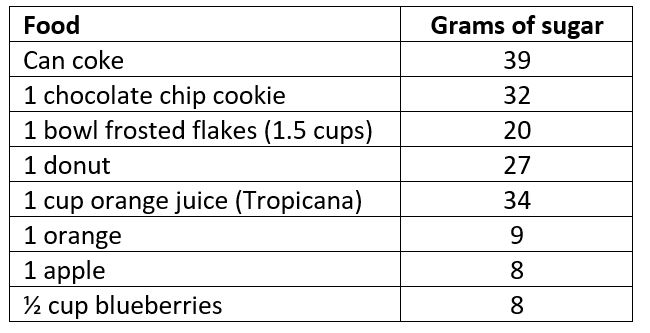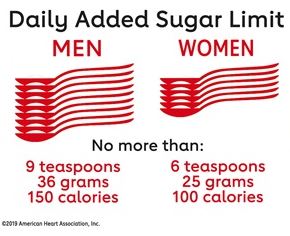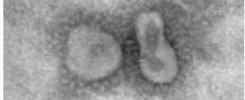The short answer is yes AND no! It is not quite as clear cut as “sugar is sugar”.
What is the same?
Sucrose has the same chemical structure no matter what the source. Sucrose is a disaccharide that contains 50:50 glucose and fructose molecules. Glucose and fructose are both monosaccharides that have the molecular formula C6H12O6.

If sugar is extracted from any source such as sugar beet, sugar cane, or corn then it will have some ratio of glucose and fructose and it will all have 4 Calories per gram (as do all carbohydrates including complex carbohydrates), so about 16 Calories per teaspoon. Here are some examples of the ratio of glucose and fructose in various types of sugar and fruit. The sugar chemical structure and ratios are very similar, no matter what the source. Some sources have free glucose and/or fructose, some have most of it bound together as sucrose. Either way, when we consume it, the sucrose has to be digested with an enzyme called sucrase, and then we can absorb glucose and fructose into our bloodstream.

So does that mean a can of coke is the same as eating fruit? No.
What is different?
- How much sugar you are consuming
- How quickly it is digested and absorbed
- How it impacts your brain – dopamine reward response
When you eat snacks that have added sugar you are generally consuming more total grams of sugar than if you ate fruit. Examples of foods with added sugar compared to foods containing natural sugar like whole fruit.

Let’s compare the orange juice to the orange. Why are they different? When you remove the fibre from the fruit you can consume a whole lot more volume of just liquid, which is where all the sugar is. I think that most people would not likely sit down and eat 4 oranges but it is pretty easy to drink 1 cup of orange juice. So the issue is not that there is something different about the sugar molecules, it is simply a concentration difference.
Another major difference between an orange and a glass of Tropicana is that the orange is a whole food so it contains fibre (3g), antioxidants, vitamin C, vitamin A, potassium, calcium, some iron, and many other plant phytochemicals. The Tropicana is refined and processed so all beneficial antioxidants are removed and it is basically a cup of sugar water that is not that much different from the can of coke.
In the picture at the top of the post. The ½ cup of grapes, 20 raisins, and 2 tsp of sugar, all have the same total amount of sugar – 8g. Let’s suppose you were going to add those to oatmeal.
- That would be a lovely amount of grapes to add to a bowl of oats, you would get 8g of sugar, tons of fibre and nutrients.
- If you added raisins to the oatmeal, you would most likely add 2-3X that amount for 1 bowl, increasing your sugar to 16 – 24g.
- And as a comparison, a bowl of packaged sweetened Quaker oatmeal contains 26g of sugar.
The rate of digestion for an orange compared to orange juice is different. Because the orange contains fibre, it will take a little longer to digest, it has less total sugar as well so the rate at which the sugar enters the bloodstream is slower than the juice. When sugar is absorbed more slowly, it will not over-stimulate the pancreas to produce excess insulin. Insulin tells cells like the liver and fat cells to take up extra sugar from the bloodstream and store it as fat. If sugar is absorbed slowly it is more likely to be used by your cells to make energy, whereas secreting a high amount of insulin will cause more to be converted into fat.
Consuming high amounts of sugar on a regular basis, and therefore having high insulin secretion on a regular basis, means that the cells will gradually stop responding to the insulin….over time, insulin-resistance can develop which leads to type 2 diabetes.

The rate and amount of sugar absorption affects your brain. Our brains LOVE sugar because it is so high in energy. We have genes that make us quite enjoy sweet foods because eating high energy foods had a survival benefit before we could access food 24-7. Sugar has a very strong impact on our reward system. Consuming sugar makes us feel good because we produce dopamine. You make much more dopamine consuming donuts or pop than you ever would from eating fruit because of how much and how quickly it is absorbed. The problem with making a lot of dopamine is that you create a feedback loop in your brain that triggers you to want more. This makes controlling your overall total calorie intake much more difficult, which does not happen if you are eating fruit.
There is a blood test called HbA1C that measures the amount of sugar that is attached to your hemoglobin in your red blood cells (indication that sugars are attaching to other cell proteins and affecting function as well). Eating a high fruit diet actually lowers A1C levels compared to high added sugar diets. Next time you get a blood test, ask to have your A1C checked, you want it to be below 6%.
Excess sugar consumption is highly associated with cardiovascular disease, type 2 diabetes, obesity, mood disorders, metabolic syndrome, fatty liver disease, and chronic inflammation. It estimated that the average person in North America consumes approximately 90g of sugar per day.
So even though the sugar in fruit and coke are technically chemically the same, the fruit has less total sugar, is absorbed slower, does not impact insulin the same as added sugar, contains healthy micronutrients and will not mess with your dopamine system.


Thanks for making technical explanations so easy to understand, and for providing practical examples!
Rosemary